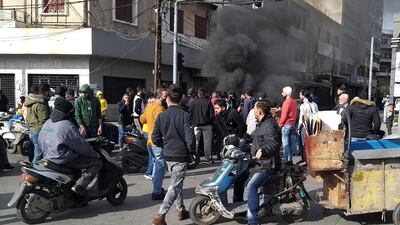Lebanon's security forces disappeared and tortured protesters after anti-lockdown demonstrations in the northern city of Tripoli in January, according to a new report by Human Rights Watch.
The report says dozens of protesters were charged with offences such as "terrorism, forming criminal associations and stealing public property", while false confessions were beaten out of others.
One case documented in the report is the alleged torture of a 15-year-old in detention by military intelligence in Tripoli's Qobbeh neighbourhood.
The boy was subjected to a technique known as falaka, or a beating on the souls of the feet. Another was threatened with the “balance”, a method of torture where the detainee is suspended by their wrists, which are tied behind their back.
Other issues detailed were the forced disappearances of dozens of protesters for anything between one and five days – a crime under international law.
Lawyers for the detained said that efforts by family members to find out where they were being held were met with denials by Lebanese intelligence and police.
The mother of one of the detainees – Tarek Badawiyyeh, 28 – told Human Rights Watch that she was unable to find any information about her son for three days.
“I didn’t leave a person or a place that I didn’t ask,” she said.
“But no one knew … I thought maybe someone beat him or killed him. You know the situation in the country. For three days, I was living in hell. I thought my child was gone.”
Protests erupted in the northern city at the end of January in response to a dire economic situation and a suffocating lockdown in response to the Covid-19 pandemic.
The demonstrations turned violent, with cars being burnt, and Molotov cocktails being thrown at the security forces. The army was eventually called in to quell the unrest.
The report criticised the Lebanese authorities for detaining protesters under anti-terrorism legislation, with charges being used summarily, something Human Rights Watch said "could have a chilling effect on free speech and assembly".
It detailed 19 instances of protesters being denied access to a lawyer, after false claims they had waived their right to one.
Aya Majzoub, Lebanon researcher at Human Rights Watch, said the “Lebanese authorities should address the legitimate grievances of people in Tripoli, but instead they’ve escalated repression against a population fighting for a dignified life”.
“The government needs to answer for disappearing and any torture of detainees and drop all unsubstantiated terrorism charges against them,” she said.


